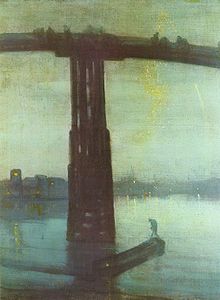- Lightermen
-
Lightermen were workers who transferred goods between ships and quays, aboard flat-bottomed barges called lighters in the Port of London.
Contents
History
They were one of the most characteristic groups of workers in London's docks during the heyday of the Port of London, but their trade was eventually rendered largely obsolete by changes in shipping technology. They were closely associated with the watermen, who carried passengers, and in 1700 joined the Company of Watermen to form The Company of Watermen and Lightermen. This is not, strictly speaking, a livery company but a "City Company Without Grant of Livery", formed in 1700 by Act of Parliament. The Guild continues to licence watermen and lightermen working on the River Thames. Watermans' Hall is located at 16 St Mary At Hill, in Billingsgate, it dates to 1780 and is the only surviving Georgian guild hall.
The construction of the docks was bitterly opposed by the lightermen and other vested interests, but went ahead anyway. However, they did win a major concession: what became known as the "free-water clause", first introduced into the West India Dock Act of 1799 and subsequently written into the Acts governing all of the other docks. This stated that there was to be no charge for "lighters or craft entering into the docks ... to convey, deliver, discharge or receive ballast or goods to or from on board any ship ... or vessel." This was intended to give lighters and barges the same freedom in docks that they enjoyed on the open river. In practice, however, this proved highly damaging to the dock owners. It allowed ships to be loaded and unloaded overside, using barges and lighters to transfer their goods to and from riverside wharves rather than dock quays, thus bypassing quay dues and dock warehouses. This significantly reduced the docks' income and harmed their finances, while boosting the profits of their riverside competitors. Not surprisingly, the dock owners lobbied vigorously—but unsuccessfully—for the abolition of this damaging privilege.
Operation
The lightermen were a vital component of the Port of London before the enclosed docks were built during the 19th and 20th century. Ships would moor in the middle of the River Thames and transfer their goods aboard lighters. Lightermen would then ride the river's currents—upstream when the tide was coming in, downstream when the tide was out—to transfer the goods to quay-sides. They also transferred goods up and down the river from quays to riverside factories and vice-versa. This was an extremely skilled job, requiring an intimate knowledge of the river's currents and tides. It also demanded a lot of muscle power, as the lighters were unpowered; they relied on the current for motive force and on long oars, or "paddles",[1] for steering.
The lightermen's trade was eventually largely swept away by the economic and technological changes, particularly the introduction of containers, which led to the closure of most of London's upriver docks in the 1960s.
Few written accounts of the process of becoming an apprentice now exist, though the best-known is Men of the Tideway by Dick Fagan and Eric Burgess. (Fagan worked as a lighterman for more than forty years). In the book, Fagan mentions the exploitative nature of lighterage and expresses his disdain for what he called a "free-for-all capitalist system".[2]
See also
Notes
- ^ Men of the Tideway by Dick Fagan and Eric Burgess, 1966 (See first sentence of p.22)
- ^ Fagan and Burgess, 1966 p.23
External links
- Watermen's Hall Official Site
- Men of the Tideway by Fagan and Burgess (Chapters 1 & 2 available only)
- Waterman's Hall
- Company of Watermen and Lightermen
- http://www.portcities.org.uk/london/server/show/conMediaFile.1397/A-London-lighterman-c-1910.html
- Thames Lighterman photos
- Lighterman apprentice certificates and licences
Bibliography
- Stephen Dobbs, The Singapore River, Part 1 - 3 Lightermen: Migration and destiny. This book devotes a chapter to Indian lightermen in the Singapore River.
Categories:- Marine occupations
- Livery companies
- Economy of London
- 1555 establishments in England
- Transport on the River Thames
- Port of London
Wikimedia Foundation. 2010.


